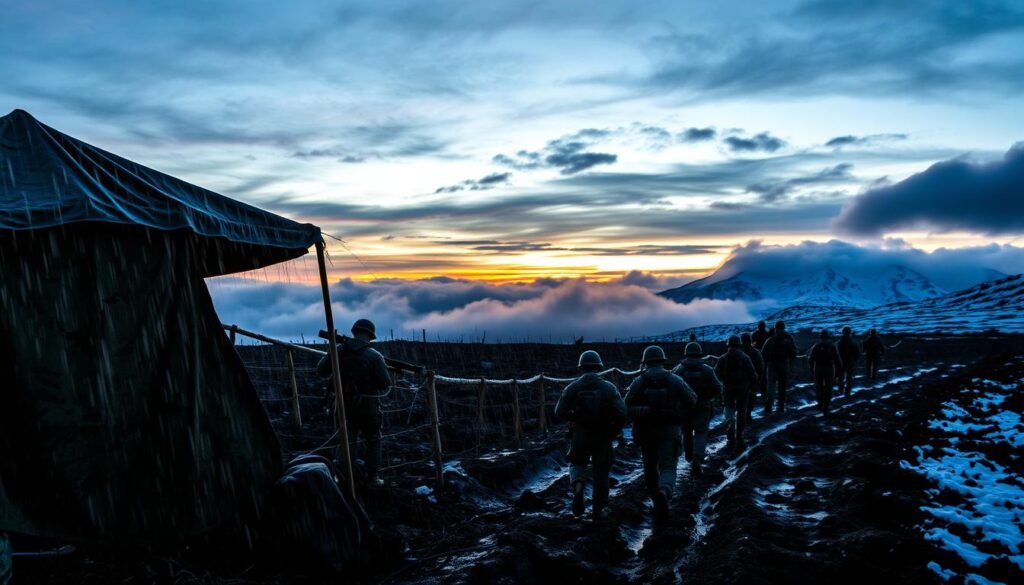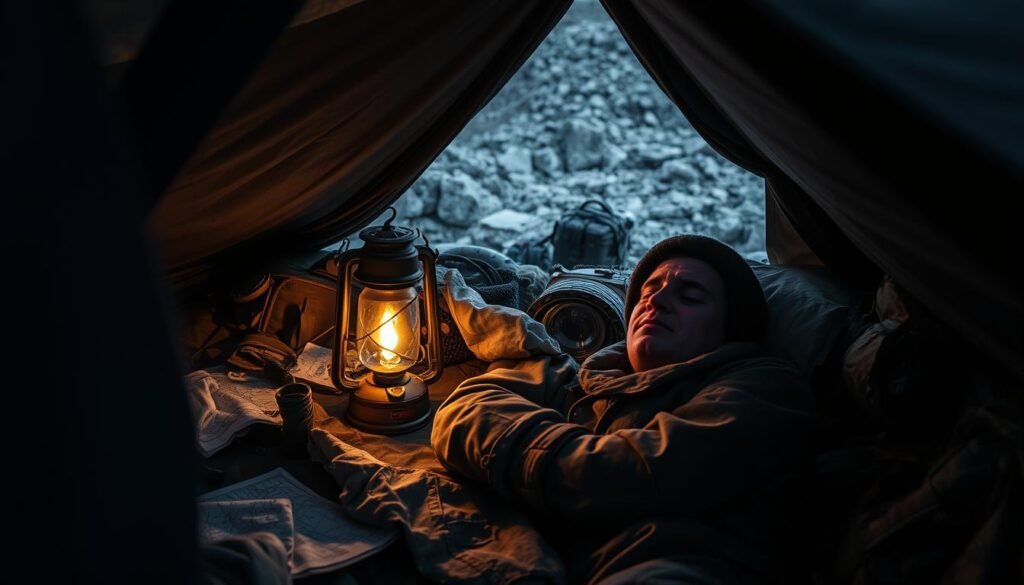Did you know more than 70% of military people say they get tired? This fact is crucial because it impacts their readiness. Fatigue from fighting and training is a big problem. It makes soldiers slower, less sharp, and more likely to have accidents.
The causes of fatigue in combat and military training come from many hard situations. Soldiers face tough training and physical work. Knowing why is key to making them stronger and more effective. Sleep loss alone makes a big difference in readiness. A study found that not enough sleep can cause accidents in the military. This shows we need smart plans to fix this issue. To learn more, see sleep deprivation and its effects.
Key Takeaways
- Fatigue can cause safety problems and more accidents in the military.
- Hard work, lack of sleep, and stress lead to tiredness.
- Understanding fatigue helps improve how soldiers perform and succeed in missions.
- Most military people only get about 6 hours of sleep.
- It’s very important to focus on rest to stay ready for action.
- Tiredness really affects thinking and quick movements.
- Not drinking enough water and the environment can also make soldiers more tired.
Understanding Military Training and Its Demands
Military training involves activities that need a lot of physical and mental work. These actions make sure soldiers are ready for any challenge in combat.
Physical training is key in getting ready for the military. It helps build endurance, strength, and physical abilities. This includes workout programs aimed at reaching the best performance. The Army now focuses on exercises that improve cardio, strength, and power. These are crucial for the tough military training demands.
Field training exercises (FTXs) mimic real-life situations. Soldiers get to practice important skills in a safe setting. These exercises often involve carrying heavy things, making the body work harder and leading to tiredness. Not preparing well for these can mean a higher chance of getting hurt or too tired during these activities.
| Training Component | Description | Importance |
|---|---|---|
| Physical Training | Structured exercises to build endurance and strength | Essential for optimal performance in combat |
| Field Training Exercises | Realistic simulations of combat scenarios | Enhances practical skills and teamwork |
| Muscular Endurance | Training to sustain prolonged physical activity | Reduces fatigue during extended operations |
| Aerobic Conditioning | Improves cardiovascular efficiency | Critical for long-duration missions |
As military operations change, focusing on physical training is more important. Knowing all about military training helps with planning. It also ensures soldiers are well-taken care of.
The Role of Physical Exertion in Inducing Fatigue
Physical exertion is a key cause of fatigue in military training. Soldiers do activities like loaded marching and tactical moves. These can hurt muscles. Studies show soldiers often feel sore for hours or days after. This soreness lowers their strength and affects their performance.
Fatigue fractures in soldiers are common injuries. A study of 4,029 men found 1.1% had these fractures, mainly in the leg and foot. These happened mostly in the first three months of service. They caused a lot of missed training days. Soldiers who were active before joining had fewer fractures. This shows being in shape before can help.
It’s important to watch how muscles recover to keep soldiers ready and prevent injuries. Basic training usually has about 17 hours of exercise a week. There are also 6.5 hours of sports. This shows why it’s vital to manage physical stress well. It helps keep soldiers in top shape for their duties.
| Parameter | Data Points |
|---|---|
| Fatigue Fractures Incidence Rate | 1.27 per 1000 follow-up months |
| Active Military Training Days Lost | 1359 days due to fatigue fractures |
| Fatigue Fractures in the First 3 Months | Most occurrences noted |
| Weekly Physical Training Hours | ~17 hours |
| Sports-Related Physical Training Hours | ~6.5 hours |
| Protective Activity Rate Ratio | 0.41 (95% CI: 0.20 to 0.85) |
Sleep Deprivation among Military Personnel
Sleep deprivation is a big problem for those in the military. This is due to the tough demands of training and operations. Recruits during Basic Military Training (BMT) get about 6.3 hours of sleep each night. Their sleep efficiency is around 85.6%. This lack of sleep makes stress and tiredness worse. It makes performing well very hard.
Impact of Irregular Sleep Patterns
Irregular sleep patterns really affect how well military personnel can do their jobs. Mental tiredness can hurt important skills like staying power, moving, and making decisions. Recruits who are more stressed at the start of BMT are more likely to leave. Studies say this can be predicted with up to 85% accuracy. Keeping an eye on sleep and stress is key. It helps understand their effects on training. Without good recovery strategies, performance could drop, putting missions at risk.
Effects on Cognitive Function
Sleep loss greatly harms cognitive function, essential for military tasks. Over 76% of service members get less than seven hours of sleep. This lack of sleep can harm decision-making skills. Research shows those who sleep less than seven hours perform like they’re under the influence. This is a big issue for mission readiness. Better sleep management is urgently needed. Improving sleep can help both individuals and the team do better.
Mental Stress: Psychological Factors Contributing to Fatigue
Mental stress plays a huge role in psychological fatigue for those in the military. A survey from the U.S. Department of Defense shows 87% of soldiers feel stress from their jobs. This kind of pressure can lead to combat stress reactions.
Such reactions can really affect how a soldier performs. They have to be always alert in dangerous situations. This leaves them no time to relax emotionally.
Soldiers face not just physical challenges. They also deal with emotional ones like anxiety and fear during missions. Studies show that people with more body fat might struggle more with stress. This can affect important mental skills, including attention and understanding space.

It’s key to understand psychological fatigue and how mental stress causes it. The Transactional Theory of stress explains how stress comes from how people interact with their environment. This can lead to feeling overwhelmed, lowering performance, and increasing fatigue in the military.
Making sure soldiers are mentally healthy and can manage stress well is vital. Studies on cognitive resilience show soldiers can keep some focus and attention even under stress. We need to put mental health first to support and adapt well.
| Factor | Impact on Soldier Performance |
|---|---|
| Mental Stress | Increases risk of psychological fatigue and hinders decision-making. |
| Combat Stress Reactions | Can lead to decreased morale and efficiency during missions. |
| Anxiety during Missions | Effects cognitive function, leading to mistakes in judgment. |
| Emotional Challenges | Exacerbates fatigue and impacts mental resilience. |
Hydration and Its Importance in Combat Training
Staying hydrated is crucial for soldiers in combat training. It helps them perform their best. Even a little dehydration can lower strength and stamina. If soldiers don’t drink enough, they can’t think clearly and their training suffers.
Consequences of Dehydration on Performance
Dehydration can really hurt a soldier’s performance. Losing just 2% of body weight can make soldiers less motivated and effective. When dehydration gets worse, they can get headaches, feel dizzy, or not care about things. This often happens when they lose 5% to 7% of their body weight.
During tough missions, soldiers might need up to 12 liters of water a day. This depends on the weather, how hard they’re working, and their size. Not drinking enough water can lead to heat exhaustion or even worse.
Strategies for Maintaining Hydration
Soldiers have to follow certain rules to stay hydrated. Drinking water before working out helps. They also need to keep track of how much water they drink. This is especially true in hot weather or during long workouts. Teaching soldiers about how much water they need helps a lot.
- Encourage drinking water regularly, not just when thirsty.
- Monitor urine color to assess hydration status; clear indicates proper hydration, while dark yellow suggests dehydration.
- Increase water intake during extreme climate conditions.
Using these tips can help keep soldiers hydrated and ready for training.
Environmental Factors Impacting Soldier Fatigue
The military works in all sorts of combat conditions. Things like temperature, humidity, and high places can make soldiers more tired. For example, being too cold has hurt military work in the past, leading to severe injuries or death. Getting frostbite is common when it’s very cold, even slightly above freezing.
Being at high altitudes tires soldiers out more, making it harder to perform well. The extra effort means they can’t do as much, especially in long missions. Without enough sleep, a soldier’s ability to do their job can drop by about 25-30% after just one day. Lack of sleep, due to the environment and stress, is a big reason why soldiers get tired in combat conditions.
Noise is another big challenge in the military. Loud, sudden sounds can damage hearing for good after just a little bit. Problems with hearing can mess up important things like talking to each other and staying alert. Along with other issues, this shows how different factors affect how well soldiers can do their jobs.
It’s important to deal with these tough conditions. Training programs must get soldiers ready for all sorts of weather and situations. This helps keep them healthy and ready to fight.

Causes of Fatigue in Combat and Military Training
Fatigue in combat and military training comes from many challenges. Extreme weather conditions and difficult terrain are two main reasons. It is crucial to understand these to manage troops well.
Impact of Extreme Weather Conditions
Extreme weather like heat, cold, or rain can tire soldiers out fast. Heat can cause heat exhaustion, hurting how well soldiers think and make decisions. Cold weather can lead to hypothermia, making military tasks harder.
The effects on physical and mental abilities are big. This means soldiers need the right training and plans to deal with these conditions. Studies have shown that bad weather really increases military tiredness.
Difficult Terrain and Its Effects on Energy Levels
Dealing with rough terrain is hard for soldiers. Rough ground makes them use more energy, making them tired quicker. Moving through hills, forests, or cities adds to this tiredness. It hurts how well and long they can keep going.
This shows why being prepared and in good shape is important. Soldiers not ready for these challenges will find it hard to keep up. Their ability to handle threats gets worse.
| Weather Condition | Effects on Soldiers | Mitigation Strategies |
|---|---|---|
| Extreme Heat | Heat exhaustion, decreased cognitive function | Hydration, gradual acclimatization |
| Extreme Cold | Hypothermia, impaired motor skills | Layered clothing, regular breaks |
| Heavy Rain | Reduced visibility, slippery terrain | Weather-appropriate gear, tactical planning |
For more info on how stress affects thinking, check out this study. Tackling military tiredness means dealing with environmental challenges smartly.
Prolonged Operations and Their Fatiguing Effects
Prolonged operations test military endurance. High-stress conditions force soldiers to keep up top performance despite big demands. History shows how tough long battles can be. For instance, in the Mexican War, General Robert E. Lee went thirty-six hours without sleep. This shows how hard prolonged battles can be on soldiers. Soldiers retreating in South Carolina during the American Revolution went days with barely any sleep.
Nowadays, tough training programs like Ranger School leave students with about three hours of sleep per night. Remote piloted aircraft (RPA) operations go on non-stop, making soldiers tired from constant telewarfare. Not having enough people to do the job can make it hard to get enough rest, making the tiredness worse. To fix this, smart planning and good rest schedules are key to keep up performance.

To fight operational fatigue, taking breaks and using caffeine wisely can help stay sharp. Military studies have found that drugs like Modafinil can help when you can’t get enough sleep. The current military approach includes planning for sleep needs in their strategies.
Operation Iraqi Freedom shows how demanding operations can be: coalition aircraft flew up to 2,000 sorties a day, and warships launched 500 cruise missiles. Soldiers traveled far, pushing their limits hard. Many reported getting only three or four hours of sleep for many days. Adults usually need about 8.5 to 9.25 hours of sleep nightly to do their best. So, the military needs ways to help during long operations. For more on work fatigue and its impacts, the Three-Dimensional Work Fatigue Inventory has useful research.
| Operation | Sorties per Day | Cruise Missiles Launched | Average Sleep Hours |
|---|---|---|---|
| Operation Iraqi Freedom | 1,500 – 2,000 | 500 | 3 – 4 |
| Ranger School | N/A | N/A | 3 |
| General Lee’s Movement | N/A | N/A | 36 hours without sleep |
The Physiological Demands of Military Exercises
Military exercises put a lot of strain on soldiers, often causing muscle damage. This means they need to carefully focus on recovery. Knowing how these challenges link up helps improve training and results.
Muscle Damage and Recovery Needs
Hard activities like running and lifting weights can hurt muscles. This damage needs time to heal properly. How much recovery someone needs depends on the damage, how tough the training was, and how they respond.
Good recovery plans help lessen the damage and make soldiers stronger for the next round of training. Some key strategies include:
- Rest and rehabilitation to give tissues time to repair.
- Nutrition that focuses on eating protein to help fix muscles.
- Hydration to help the body work right.
Understanding recovery is crucial for military personnel. It keeps them performing well, even under great stress.
Anabolic Hormonal Responses and Their Role
Different hormones help soldiers recover their strength and endurance after training. Anabolic hormones like testosterone are important for fixing and growing muscles. These hormones are key to meeting the physical demands of military exercises.
By managing recovery with an eye on hormones, we can improve how soldiers perform, especially under stress. Here’s a table that shows how some hormones affect recovery:
| Hormone | Function | Impact on Recovery |
|---|---|---|
| Testosterone | Promotes muscle protein synthesis | Helps with recovery and muscle growth |
| Cortisol | Regulates metabolism and stress response | Can slow recovery if levels are too high |
| Insulin | Helps cells take in glucose | Crucial for refilling energy |
| Growth Hormone | Aids in growth and cell reproduction | Helps with muscle repair |
Nutritional Deficiencies and Soldier Performance
Nutritional deficiencies are a big problem for soldiers during training and combat. They need to keep their energy high, as their jobs require a lot of physical and mental work. Good military nutrition helps improve their performance. This makes sure they can handle the tough demands of their duties.
Normally, soldiers need about 45 kcal·kg FFM-1 · d-1 for basic metabolic functions. When this drops below 30 kcal·kg FFM-1 · d-1, like with Triad and RED-S syndromes, their physical performance can go down a lot. With less energy, their metabolism slows, which lowers their energy use.
Using the right nutritional strategies is very important to overcome these problems. Evidence from World War II showed that soldiers ate better and performed better in combat. Now, military rations have 13% to 15% protein, which helps them perform well in different situations. But, they can still face deficiencies due to extreme weather, lack of sleep, and other stressors that affect their energy and effectiveness.
Soldiers in tough environments need enough calories and a good mix of fats, carbs, and proteins. Recent studies have shown it’s important to know how environment and nutrition work together to improve military performance. It’s critical to fix nutritional deficiencies to keep soldiers energetic and performing well.
| Nutritional Aspect | Optimal Values | Consequences of Deficiencies |
|---|---|---|
| Energy Availability | 45 kcal·kg FFM-1 · d-1 | Reduced performance & fatigue |
| Low Energy Availability | Below 30 kcal·kg FFM-1 · d-1 | Impaired metabolic & endocrine function |
| Protein Intake | 13% – 15% | Muscle fatigue & recovery issues |
| Typical Energy Intake (Garrison) | 2,730 – 3,260 kcal | Varied performance based on caloric surplus/deficit |
Conclusion
Fatigue in military training is complex and affects soldier performance greatly. It involves adrenal fatigue, muscle damage, and psychological stress. There’s a significant impact on muscles, with studies showing a large change after training. It’s clear that both physical and mental aspects of fatigue need attention.
To fight fatigue, a detailed plan is needed. This plan should include rest, water, and good food to boost performance. Soldiers who were active before joining have lower fatigue fracture rates. A study showed an incidence rate ratio of 0.41, highlighting prevention’s value.
Military leaders are working hard to keep their teams ready for battle. They focus on health and broad strategies to tackle fatigue. For more tips on dealing with adrenal fatigue, check out these expert recommendations.